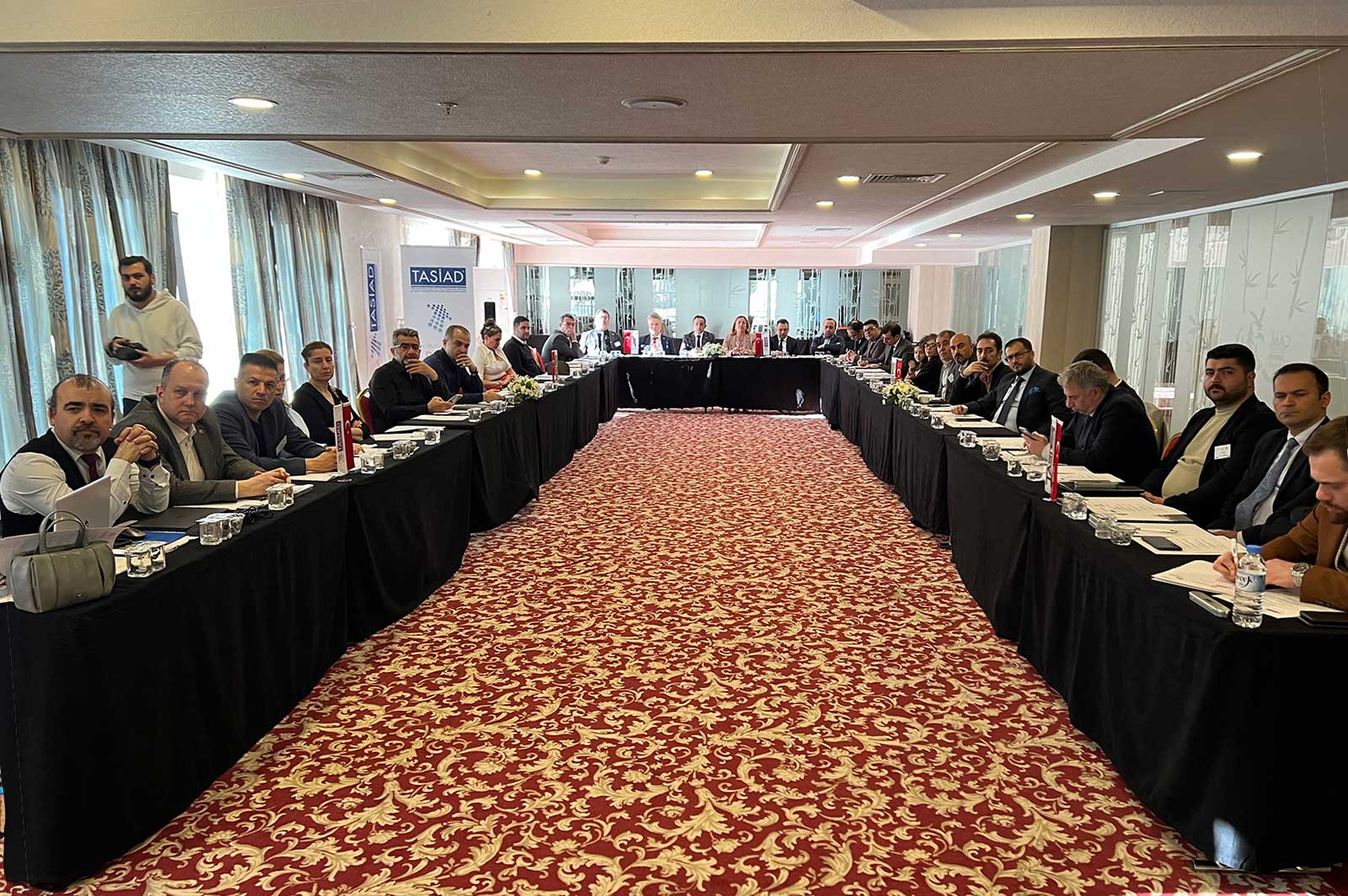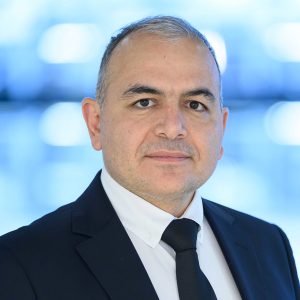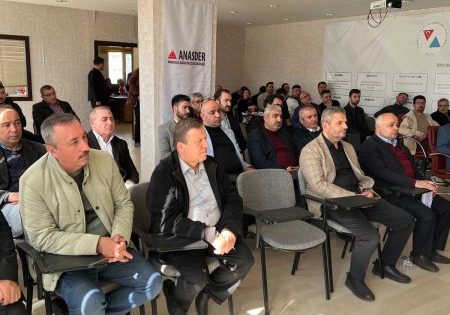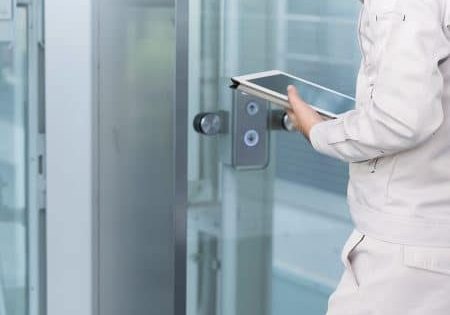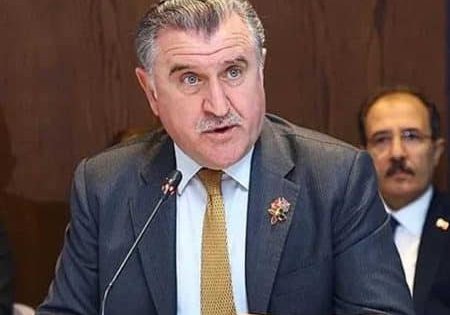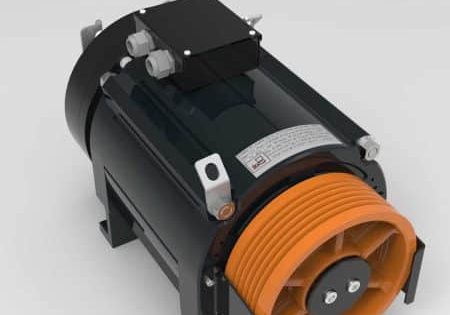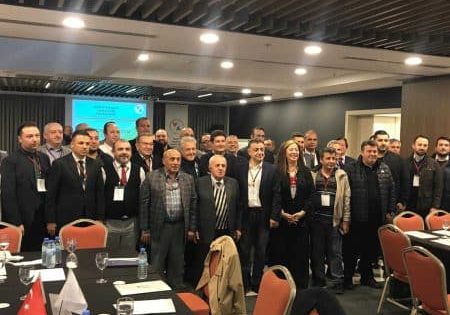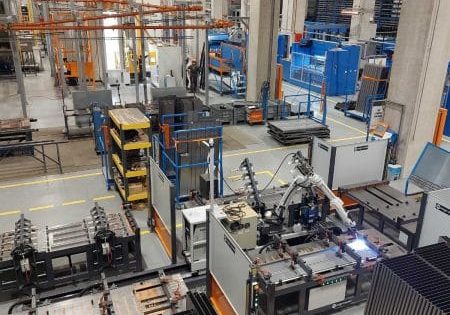All Elevator Industrialists’ and Businessmen’s Association (TASİAD) and All Elevator Industry Employers’ Union (TASİS) hosted the “Workshop on the Improvement and Development of Elevator Activities” on February 28-29 in Kızılcahamam, Ankara.
First Day
Non-Governmental Organizations, Ministry of Industry and Technology, Ministry of Environment and Urbanization, MMO, EMO, TSE, Type A Inspection Bodies, Notified Bodies and manufacturers and installation companies participated in the workshop representing all stakeholders in the sector. On the first day of the event, which took place at Ankara Kızılcahamam Çam Hotel, the guests came together for the opening speeches.
Yasemin Bulut, chairman of the Board of Directors of TASİAD, who first took the floor at the opening ceremony, which was hosted by Cansu Anıl from TASİAD, said in her speech, “We, as the representatives of a multi-component sector evaluated in the very dangerous class category, have come together here today to examine the safety weaknesses and causes of elevators, which are an indispensable element of modern life. Disruptions in the operation of the design, production, implementation, maintenance and control mechanisms of elevators, and the deficiencies that have emerged over time in legislative practices are the causes of elevator accidents that are increasing day by day in our country. I sincerely believe that the final report of our workshop, where we will discuss what needs to be done to eliminate these dangers, will be a very important resource for the improvement of our sector.” Referring to the lack of data in the sector, Bulut said: “As we all know, we cannot manage anything that we cannot measure. For this purpose, we aim to reach the statistical data we need in the sector with our ‘How Many People Are We in the Elevator’ project, which we will launch throughout Türkiye.”
Selda Baloğlu Tokoğlu, chairman of the Board of Directors of the Aegean Elevator and Escalator Industrialists’ Association (EAYSAD), said, “We are all saddened by the fact that the problems continue to increase in parallel with the increase in the number of elevator companies in our sector in recent years, and unfortunately, we are only remembered by elevator accidents in the public. I believe that it is beneficial to create an image of togetherness before the Ministry, to meet and to hold joint meetings. However, unfortunately, knocking on the door of the ministry separately from EAYSAD, TASİAD separately, TASİS separately and TASFED separately affects our image in the eyes of the ministry negatively, in my opinion…” In addition, in her research conducted only in the Izmir region for companies operating illegally in recent years, she stated that while the number of elevator companies that received a Service Adequacy Certificate (HYB) was 194, the number of current accounts she received from her market seller friends was 550, and drew attention to the high number of companies that gained unauthorized and unfair profits.
Speaking afterwards, TASIS President Turgay Kuluğ said, “As you know, the elevator industry comes together from two important components. Component manufacturers and installation contracting companies. While there is a side that does its job very well and strives to do it within these two sides, there is also a very large audience that does the opposite. Hopefully, we will stop this bleeding by putting a finger on these failing points, so to speak, this bleeding wound.”
TSE Inspection and Surveillance Center Presidency, Center President Cengiz Gören said, “As TSE, we are present in many parts of this sector. At the beginning of these, we are also on the standard preparation side. On the other hand, we are also involved in the field of periodic inspections that touch the citizens in the field of public security. I think it is a great chance to have all the actors of the sector here.”
Following the opening speeches, a group photo was taken. After the break, the guests met again for dinner.
Day Two
The second day of the workshop started under the moderation of Mustafa Görmüş from D Kare Surveillance Testing and Certification. Before moving on to the presentations, he briefly talked about the concept and invited TASİS legal counsel Lawyer Selin Aslan Öztürk to the podium for the first presentation. In her presentation on “Accidents / PGD / Legal Evaluations of Local Administrations,” Öztürk shared the data they collected on accidents that occurred between 2010 and 2023.
In addition to the striking figures she gave, Öztürk also detailed the main causes of these accidents, such as the failure of safety components to function in accidents involving users, improper interventions in elevator units, accidents that occur during rescue activities, accidents caused directly by the user, and accidents caused by out-of-purpose and capacity use. When it comes to law, at the end of the presentation, both the HYB renewals of the companies and the legal problems experienced within the scope of PGD were discussed in detail by the parties.
The second presentation was made by Zafer Demirkol, member of TASİAD Technical Working Group, with the title of “Presentations from Installation Companies.” In his speech, he said, “The elevator is the work of art of our master and engineer who placed it in the well” and stated that the laborers in the sector and everyone serving in this sector should be respected. Stating that there are many nonconformities and accidents in elevators due to external and structural problems, he said that although there are many multilateral problems, the invoice is paid to the elevator company in the shaft. He conveyed some examples of problems arising from structural reasons with striking pictures and examples. In addition, he said that the problems caused by the materials and parts used also confront the companies with the end user. He stated that as a result of the accidents and complaints, regardless of the source of the problem, even problems caused by electrical or defective products are reflected to the installation companies.
Speaking on behalf of the Ministry of Industry and Technology in the question-and-answer section, İlyas Menderes Büyüklü stated that the Elevator Regulation is very democratic and the responsibilities of all parties are clearly defined, and that the important parties must comply with these obligations. In addition, the problems and disruptions experienced in the field due to the low inspection prices were also discussed by the parties.
The third presentation was made by Dr. Şakir Karakaya, head of Elevator and Machinery Department of the Ministry of Industry and Technology, under the title of “PGD Inspection Processes for Elevators.” Karakaya, who started his presentation with an interactive survey, asked the guests in the hall to answer the questions he prepared on a web site he forwarded, and reflected the answers live on the screen. In the live survey, negative answers to questions such as “How do you evaluate the general performance of domestic Notified Bodies and Type A Inspection Bodies in our country?” and “Which nonconformities do you think are the most common in the inspections for elevator safety components?” drew attention. One of the striking questions in the live survey was the question about the results of the inspection they carried out for 33 safety components. About 90% of the respondents voted that it might have been inappropriate. In the following parts of the presentation, Karakaya, who gave information about the nonconformities detected by giving information about PGD activities, gave examples about the tests they performed in the MESYEB Test laboratory in Bursa and explained what kind of process they followed. He also said that efforts are underway to expand the scope of safety components that can be tested within the MESYEB.
Burak Demircan: “The number of elevator companies is almost the same as the number of hairdressers!”
The first presentation after the coffee break was made by Burak Demircan from MMO with the title of “National and International Elevator Inspections and Local Problems.” In order to give an idea to the people in the hall, he gave information about how such examinations are carried out in the U.S. and the European Union, which are among the leading countries in the world. For example, he stated that these issues are included in good detail in the ASME 17.1, 17.2 and 17.23 standards valid in the U.S. For example, he said that in the U.S., full-load tests are carried out before commissioning and every five years thereafter. He said that although there are slight differences between countries in Europe, the general practice is in line with the regulations in Türkiye. He stated that the main reasons for the problems experienced in the inspections in our country are the lack of information, quality problems, inability to understand CE labeling, lack of competent technical personnel and the effectiveness of penalties. He said that the companies in the field lack information and even do not know how to access information. As one of the biggest problems, he said, “Yes, the number of elevator companies may be high, but there must be a limit to this. I come from Izmir. The number of elevator companies is almost the same as number of hairdressers! What does this mean, how can the number of elevators to hairdressers be the same and how can we talk about quality here?”
The fifth presentation of the day was made by moderator Mustafa Görmüş with the title of “Problems Experienced in the Module G Process.” In his presentation, Görmüş gave detailed information about the modules and certification processes in the design, installation and registration stages of elevators. Speaking at the end of the presentation, Metroplast Elevator General Manager Levent Akdemir stated that with the high number of notified bodies in Türkiye, they have seen that in some cases the business has turned into document trade, with many abuses. Akdemir said, “Ethically, the organization that certifies the safety component and the organizations that inspect the elevator should be different companies. In other words, if he has authority in one, his authority should be taken from the other.” Speaking in the question-and-answer session, Tolga Sogucak from Bursa MESYEB Elevator Test Center said, “In Türkiye, there is a certification and production of safety components that are contrary to the laws of physics. How can this happen? In other words, I think that the notified bodies should be reviewed very seriously.”
Şakir Karakaya, who took the floor in the question-and-answer session, said, “The full load test should be mandatory before the first periodic control before registration.” However, he stated that due to the “ethics” issue, which was the subject of discussion in the hall, the problem was not solved again after there was a notified body and inspection body to conduct the same test.
The first presentation after the coffee break was made by Recep Aslan from the TASIS Technical Committee under the title of “Problems Related to Type A Inspection Bodies.” Aslan said, “Let’s go to any province or district of Türkiye and inspect an elevator there. Let’s have this elevator inspection done by 10 different type A inspection institutions. Do you think that the report given by these type A inspection bodies should all be the same, or should it be different? When this audit is carried out, my experience in the sector shows that even if 10 companies inspect the same elevator according to the same regulations, they can all produce different reports.” In addition, some defects that should be subject to a red label can receive a blue label; In the same way, he criticized the fact that it was given a blue label when it should be yellow label. He also criticized the fact that the personnel of the Type A Inspection organization, which was discussed earlier in the workshop, did not allocate vehicles to the personnel, so the staff received support from the elevator operator. Aslan said that the fact that the examination personnel are young and inexperienced and that they do not continue in this job for a long time due to wage conditions creates another problem.
Turgay Kuluğ: “The number of elevators registered by a company with only four employees in 2022 is 3,632!”
Subsequently, Turgay Kuluğ, chairman of the Board of Directors of TASIS, made a presentation on “Unfair Competition and Unregistered Activities.” Kuluğ shared striking figures on the number of companies operating informally: “As of February 26, the number of enterprises operating in the established order, which are currently registered by TSE in the field of installation contracting in Türkiye, is 3,190.” Against this: “According to the data we have previously received from the Ministry of Finance, the number of taxpayers operating in the field of elevator contracting is over 20,000” and drew attention to the size of the number of businesses that work without authorization and gain unfair profits.
Comparing this absurd situation in our country with the number of elevators contracting companies according to the population, Kuluğ said that while 536 companies serve a population of 445 million in Europe, there are more than 20,000 companies for a population of 85 million in our country. Again, he showed this situation with a striking example that the number of elevators registered by a company registered on the European side of Istanbul and with only four employees in 2022 was 3,632. In their calculations based on their own experience, he said that even if they work non-stop, there must be at least 1,700 employees in the company to finish elevator projects of this rate. Such paper companies can close down the next day with a huge tax debt. He stated that in order to solve this problem, the swamp should be drained; that is, these 17,000 companies should be closed.
After Tuncay Kuluğ, Zafer Güneş made a presentation titled “Problems with Notified Bodies.” While talking about the story of the formation of the notified bodies, Güneş said that some companies that entered this business at that time were not even aware of the need for a module regarding market supply. Güneş, who conveyed the problems experienced in the sector with the examples he experienced, stated that all stakeholders had a share in bringing the process to these stages and said that the culprit was not a single institution or person. Güneş said, “Everyone should sweep in front of their own house first,” meaning that everyone should start with themselves first.
The following presentation was made by Cem Çelik from D Kare Testing and Certification under the title of “Problems Faced by Safety Component Manufacturers.” First, he talked about the conformity assessment procedures of safety devices. Then, he explained in detail the path and test processes followed in the certification of safety components and listed the problems faced by manufacturers operating in this field. In this process, he explained the negative effects of design, materials, workmanship, personnel and after-sales problems with examples.
Tolga Soğucak: “Nearly 90% of the products in the market are inappropriate.”
Tolga Sogucak from MESYEB Elevator Test Center, who kept his speech short due to the intensity of the workshop program and the lengthy question-and-answer sessions, shared brief but serious information pointing to serious problems in his presentation titled “Tests for Safety Components.” Sogucak said, “Let me ask you a few questions about sharing the experiences gained in our activities. Take, for example, the brake, which is a safety component. Within what range can the capacity of this brake be within reasonable limits? For example, can there be a brake between 600 kg and 3 t? So, what does this mean, there are documents claiming that a three-person elevator and a 23-person elevator work with the same brakes.” Stating that the products in the market have a non-conformity of nearly 90%, he shared the results they made in the MESYEB Test laboratory.
At the end of his speech, Soğukcak said, “There are people who have been producing this product for 10-15 years, and they say that we did not know that this business was like this. Isn’t there a glitch here? In other words, I will not say that we have formed an opinion about the subject of the question of whether these tests have been carried out in the certification processes, but I think an idea has been formed. There should be a retrospective look at this issue.”
The last presentation of the day was made by Oktay Akmanfrom TSE with the title “Will the Elevator Sector Improve? Problems and Solution Suggestions.” At the beginning of his speech, Akman listed the problems discussed during the day and said, “I wrote this part of this presentation on 2018 because I did not remember 2020 or 2022 clearly; it was the presentation I made at the symposium of the Chamber of Engineers. Now, when we look at what is being talked about today, we are talking about the same things, nothing has changed.” In fact, he said that the same problems were discussed when he entered the sector in 2006. Subsequently, he listed the measures that can be taken regarding the issues and the solution proposals.
At the end of the day, the main problems were discussed in the planned Requests and Suggestions section. However, because time limits were exceeded in the previous presentations and the question-and-answer section was too long, there was not much time left for the question-and-answer section, so the request and suggestions section was limited to a few topics. Abdurrahman Aksöz, who took the floor in this section, led the establishment of an e-mail group with all relevant parties to make progress in discussing the same problems for years and not finding a solution.
The interested parties will submit the problems they have raised and discussed to the Ministry of Industry and Technology in a report.
Get more of Elevator World. Sign up for our free e-newsletter.
